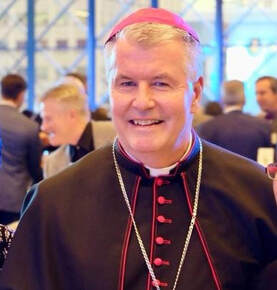 The beginning of a New Year is a time associated with taking stock of the past, looking forward to the future, and making resolutions. Actually this is a continual practice in our lives. Events such as the birth of a child, changing jobs, or simply moving, entail at some level making a new beginning. The embracing of change can be difficult at the time, yet in hindsight, the new beginning is often an event which inspires positive growth in our life. This process of beginning and growing in new ways is also a part of our spiritual journey. Beginning in Baptism, “the person baptized is configured to Christ. Baptism seals the Christian with the indelible spiritual mark (character) of his belonging to Christ.” (Catechism of the Catholic Church (CCC), 1272.) Baptism begins the journey of holiness “to be perfect as your Heavenly Father is perfect” (Matt. 5: 48) and it is restored through the grace received in the Sacrament of Reconciliation which has sometimes been referred to as the sacrament that renews this baptismal state of grace or a type of “Second Baptism”. In the spiritual life, embracing the path of change in our life and seeking sacramental forgiveness involves ongoing reflection and prayer. St. Ignatius of Loyola developed the daily Examen recognizing the importance of beginning anew each day. The Catechism of the Catholic Church speaks about the perseverance to seek continual growth in holiness, saying, "The Church on earth is endowed already with a sanctity that is real though imperfect." In her members perfect holiness is something yet to be acquired: "Strengthened by so many and such great means of salvation, all the faithful, whatever their condition or state - though each in his own way - are called by the Lord to that perfection of sanctity by which the Father himself is perfect." (CCC, 825.) The path of our holiness weaves through many ordinary life events. In his Apostolic Exhortation, Gaudete et Exsultate (GE), Pope Francis encourages the faithful to see life’s challenges as opportunities for new growth saying, “At times, life presents great challenges. Through them, the Lord calls us anew to a conversion that can make his grace more evident in our lives, “in order that we may share his holiness” (Heb 12:10). At other times, we need only find a more perfect way of doing what we are already doing: “There are inspirations that tend solely to perfect in an extraordinary way the ordinary things we do in life.” (GE, 17.) Persevering in our spiritual life has also been expressed by a few saints as Nunc Coepi or Now I Begin. The experience of beginning over and over again is a common path for each of us when we grow in faithful holiness. The emphasis on “Nunc” or “Now” affirms the importance of the present moment and the Grace of God that it holds for each one of us. St. Rose Phillippine Duchesne known for her faith-filled courage and humility, wrote, “Do not look back to the past, or forward to the future. Claim only the present for it holds God’s will.” In Gaudete et Exsultate, Pope Francis writes about the Spirit revealing the Will of God in the present moment - “Always ask the Spirit what Jesus expects from you at every moment of your life and in every decision you must make, so as to discern its place in the mission you have received.” (GE, 23.) As this new year and a new decade begin, my prayer for you is to embrace the mission God entrusts to you and to live the fullness of the present moment so that you will “allow the Spirit to forge in you the personal mystery that can reflect Jesus Christ in today’s world.” (GE, 23.) By Most Reverend William T. McGrattan, Bishop of Calgary
January 2020
0 Comments
Your comment will be posted after it is approved.
Leave a Reply. |
Author
Catholic Pastoral Centre Staff and Guest Writers Archives
July 2024
Categories
All
|
 RSS Feed
RSS Feed